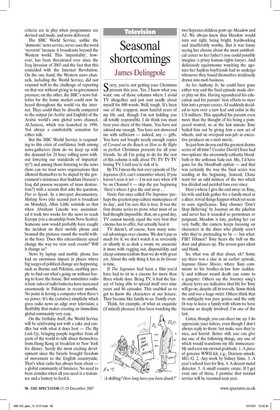Seasonal shortcomings
James Delingpole orry, you're not getting your Christmas present this year. Yes, I know what you want: one of those columns where I avoid TV altogether and just rant madly about myself for 800 words. Well, tough. It's been one of the crappest, most hateful years of my life and, though I'm not holding you all totally responsible, I do think you must bear your share of the blame. You have not adored me enough. You have not showered me with sufficient — indeed, any — gifts. You have not bought nearly enough copies of Coward on the Beach or How to Be Right as perfect Christmas presents for all your friends. So all I'm going to do for the rest of this column is talk about TV. TV TV TV boring TV. Until you're sick of it.
By TV, I mean the last-ever episode of The Sopranos (E4, can't remember when). If you haven't seen it yet — I'm not sure when it'll be on Channel 4 — skip the par beginning 'Here's where I give the end away...'
Vanity Fair once called The Sopranos 'perhaps the greatest pop culture masterpiece of its day', and I'm sure this is true. It was the first drama series to prove what most of us had thought impossible: that, on a good day, TV cannot merely equal the very best that cinema has to offer, but actually beat it.
TV doesn't, of course, have many natural advantages over cinema. We don't pay as much for it; we don't watch it as reverently or silently in as dark a room; we associate it more with vegging out, disposability and cheap commercialism than we do with great art. About the only thing it has in its favour is time.
If The Sopranos had been a film you'd have had to sit in a cinema for more than three whole days. Being TV, it had the luxury of being able to spread itself over nine years and 86 episodes. This enabled us to get to know the characters at our leisure. They became like family to us. Family even.
Think, for example, of what an exquisite (if mixed) pleasure it has been watching the two Soprano children grow up: Meadow and AJ. We always knew that Meadow would turn out right, being bright, hardworking and insufferably worthy. But it was funny seeing her choose about the most antithetical career to her father's you could possibly imagine: a prissy human-rights lawyer. And deliciously squirmsome watching the agonies her hapless boyfriends had to undergo whenever they found themselves insidiously drawn into mob business.
As for Anthony Jr, he could have gone either way and the final episode made clever play on this. Having squandered his education and his parents' best efforts to steer him into a proper career, AJ suddenly decided to turn over a new leaf and enlist in the US military. This appalled his parents even more than the thought of his being a pampered wastrel, so at the last minute Tony bailed him out by giving him a new set of wheels, and an overpaid non-job as executive producer on a mob movie.
So just how do you end the greatest drama series of all time? Creator David Chase had two options: the awesomely cathartic bloodbath or the arthouse fade-out. Me, I'd have gone for the bloodbath option — and that was certainly the way the final series was tending at the beginning. Instead, Chase went for an odd mixture of the two which has divided and puzzled fans ever since.
Here's where I give the end away: as Tony, his wife and kids gather for a family meal at a diner, trivial things happen which yet seem to ooze significance. Tony chooses 'Don't Stop Believing' by Journey on the jukebox and never has it sounded so portentous or poignant; Meadow is late, parking her car very badly; the camera keeps focusing on characters in the diner who plainly aren't who they're pretending to be — but what: FBI? Hitmen? Tony hears the bell on the door and glances up. The screen goes silent and blank.
So, what was all that about, eh? Some say there was a clue in an earlier episode, Soprano Home Movies, where Tony comments to his brother-in-law how suddenly and without sound death can come to a gangster. Others say the Journey song's cheesy lyrics are indicative that life for Tony will go on, despite all its travails. Some think the end was a huge swizz. Others think that its ambiguity was pure genius and the only fit way to leave a family with whom we have become so deeply involved. I'm one of the last.
Listen, though, you can cheer me up. I do appreciate your letters, even though I don't always reply to them: but make sure they're nice, not horrid. Better still, you can give me one of the following things, any one of which would transform my life immeasurably and earn my eternal gratitude. 1. A piece of genuine WWII kit, e.g., Denison smock; MG-42. 2. Any work by Sidney Sime. 3. A year's school fees for Boy. 4. A decent metal detector. 5. A small country estate. If I get even one of these, I promise that normal service will be resumed next year.

































































































 Previous page
Previous page